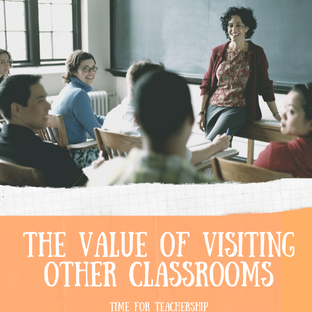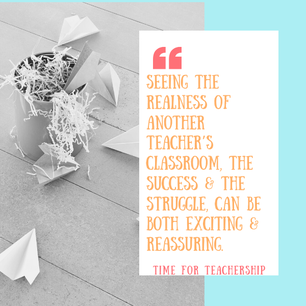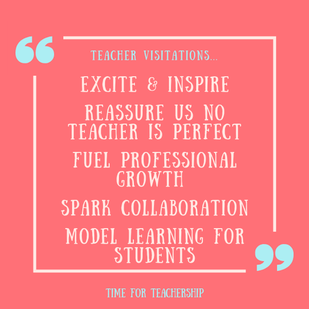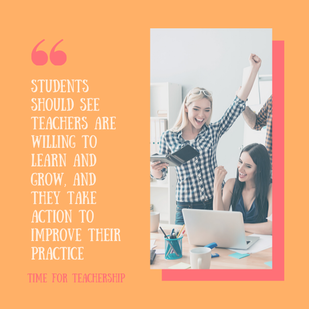|
Visiting other classrooms has been one of the most energizing forms of professional development I have had as a teacher. I love seeing the possibilities, other teachers’ styles and norms, their pedagogy and their innovative lesson activities and assessment ideas. Often, I leave with a smile and a renewed sense of “Ah, this is why I got into teaching!” Of course, not all lessons are fantastic. I’ve been in classrooms where something has gone wrong—tech didn’t work, student engagement was low, constant interruptions at the door threw the teacher off their game. But, I even found those valuable! Seeing the realness of another teacher’s classroom, the success and the struggle can be both exciting and reassuring. In one, you see new possibilities, and in the other, you can exhale with relief that no teacher is perfect, and you don’t need to strive for perfection either! Aside from the emotional benefits for the visiting teacher, there are additional reasons teachers should visit other classrooms. Professional Growth. As I mentioned, I felt excitement after visiting another teacher’s classroom. But it wasn’t just a feel-good moment that ended when school got out that day. That excitement fueled my desire to discover and explore even more possibilities, and it sparked my desire to learn and grow as a professional. A desire for professional growth is a powerful thing to feed. We know from Hattie’s (2018) research that collaborative teacher efficacy has a bigger impact on student learning than anything other factor studied. Collaboration. I love the African proverb that says, ““If you want to go fast, go alone. If you want to go far, go together.” I tend to go at things alone. I think this might be true for lots of teachers. There’s something about being inside the 4 walls of your own classroom that tends to isolate us from others. Add to that, the competitive way evaluation systems and the scourge of perfectionism can make teachers feel like they’re constantly being compared (or comparing themselves) to other teachers. Education is not always set up for quality collaboration. However, there is incredible potential in tackling a challenge together. An activity as simple as a non-evaluative, learning-oriented visit of a colleague’s classroom is a powerful way to push back on the notion of competitive comparison and change the culture of your school. Model for Students. Students notice so much. They are fully aware when there is another teacher in the room. Interestingly, given the evaluative nature of observations in schools, students may actually think other teachers are there to grade or judge you, and may adjust their behavior and participation accordingly. I’m very transparent with students. I think it’s good for them to know when it is an evaluation situation and when it’s a teacher stopping by to see how we do “x”. Students figure it out anyways. Also, students should see teachers are willing to learn and grow, and they take action to improve their practice. I cringe at the phrase, “I already have my degree,” which is often used to get students to listen and engage in the class. I’ve even used it once or twice when I was at peak frustration. (Oof, that’s hard to admit.) In saying that, we’re communicating we don’t need to grow and learn. We’re done with those things. That’s not the message we should be communicating to students. We should strive to model growth and collaboration and excitement for lifelong learning. Visiting other teachers’ classrooms is a powerful form of professional development. I know we typically think of PD as whole staff meetings with an agenda designed by administrators, but this is also PD. In fact, it’s likely even more effective—and definitely more personalized—than staff-wide PD. If you’re excited about the possibilities for teacher visitations at your school, my next post is all about how to get started. So, go ahead and locate the post that follows this one. Then, read on, inspired educator!
0 Comments
Leave a Reply. |
Details
For transcripts of episodes (and the option to search for terms in transcripts), click here!
Time for Teachership is now a proud member of the...AuthorLindsay Lyons (she/her) is an educational justice coach who works with teachers and school leaders to inspire educational innovation for racial and gender justice, design curricula grounded in student voice, and build capacity for shared leadership. Lindsay taught in NYC public schools, holds a PhD in Leadership and Change, and is the founder of the educational blog and podcast, Time for Teachership. Archives
May 2024
Categories |





 RSS Feed
RSS Feed